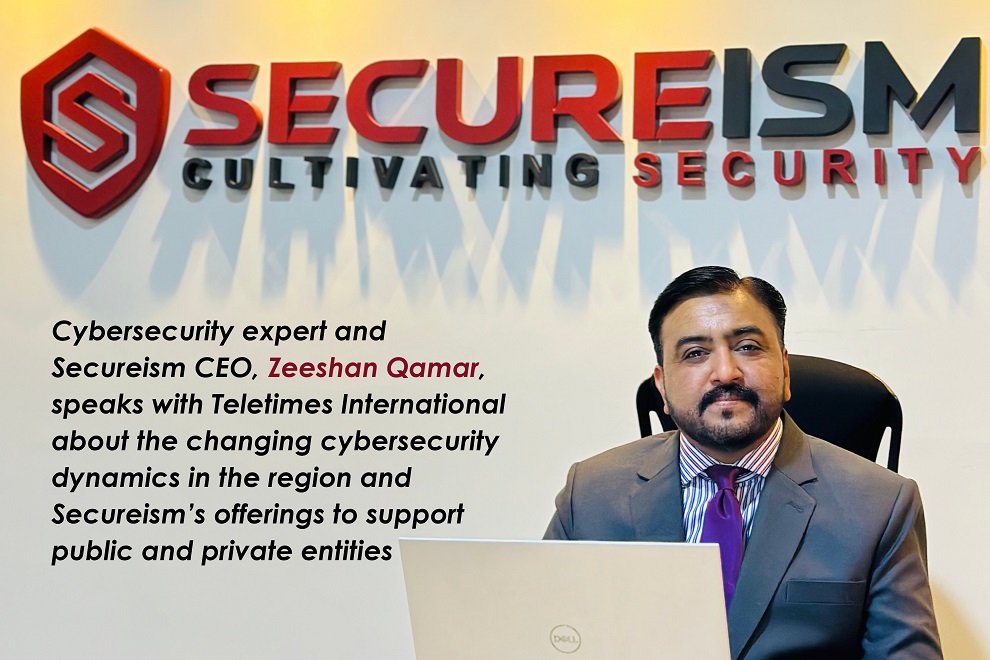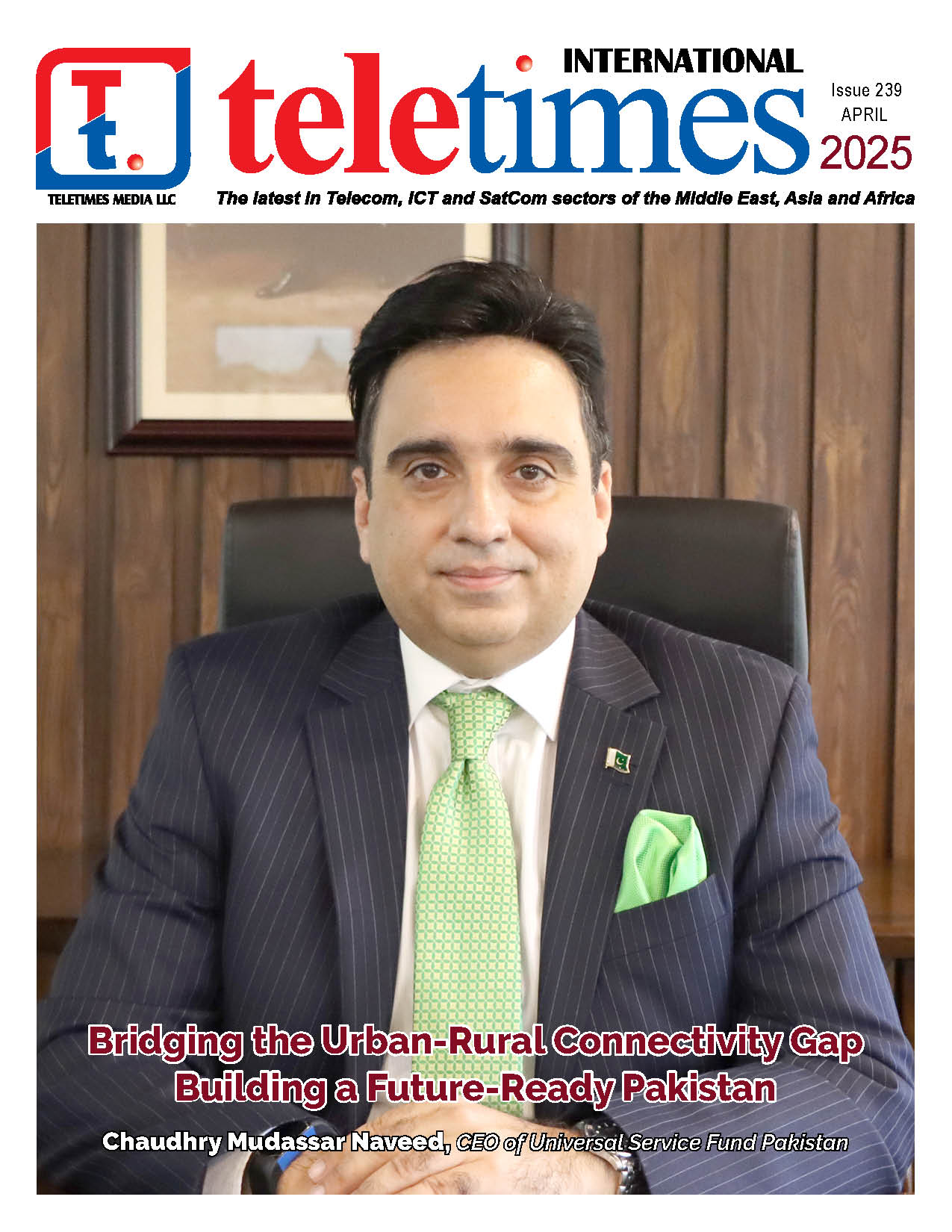Teletimes: Can you provide an overview of the cybersecurity landscape in the Middle East?
Zeeshan Qamar: The Middle East region is experiencing a rapid digital transformation, which has increased its exposure to cyber threats. Countries like the UAE, Saudi Arabia, Bahrain, and Qatar are heavily investing in smart city technologies, digital banking, and industrial automation, making them prime targets for cybercriminals. The threat landscape is diverse, with hacktivism, and financial cybercrime being predominant. Moreover, geopolitical tensions add a layer of complexity, as cyber capabilities are increasingly becoming a part of national security strategies.
TT: Can you give us an overview of Secureism and what sets it apart from other cybersecurity providers in the Middle East?
ZQ: At Secureism, we don’t just deliver cybersecurity services—we build lasting partnerships. Our mission is to align our clients’ security needs with their business goals by providing hands-on expertise and support, whether they’re looking to strengthen their security posture or respond to an active incident. We are backed by a strong technological group, a global leader in technological innovation. This partnership allows us to leverage cutting-edge advancements and set a high standard for cybersecurity excellence. What truly sets us apart is our pragmatic, client-focused approach, along with our presence and operations across multiple countries in the GCC region, including the UAE and Bahrain. This ensures that we are not only accessible but also deeply engaged with the local cybersecurity landscape.
“The threat landscape is diverse, with hacktivism, and financial cybercrime being predominant. Moreover, geopolitical tensions add a layer of complexity, as cyber capabilities are increasingly becoming a part of national security strategies”
TT: What are the primary cybersecurity challenges faced by organizations in the Middle East?
ZQ: One of the main challenges is the shortage of skilled cybersecurity professionals. Despite the growing awareness, there’s a talent gap that organizations are struggling to fill. Secondly, legacy systems and outdated software are prevalent in some sectors, making them vulnerable to exploitation. There is also a lack of a unified regulatory framework across the region, leading to inconsistent security postures and practices among different countries. Lastly, the sophisticated nature of attacks, especially those targeting critical infrastructure like energy and finance, poses a significant risk.
TT: How are governments in the region addressing cybersecurity threats?
ZQ: Governments in the Middle East are increasingly prioritizing cybersecurity. For example, Saudi Arabia has established the National Cybersecurity Authority, and the UAE has the Dubai Electronic Security Center and the National Cyber Security Strategy, similarly Bahrain has The National Cyber Security Centre (NCSC). These bodies are responsible for developing national cybersecurity strategies, protecting critical infrastructure, and responding to incidents. Additionally, several countries have implemented stricter cybersecurity regulations, like Saudi Arabia’s ECC (Essential Cybersecurity Controls) framework, to enhance the security posture of public and private sectors.
TT: What role does your managed security service, CYFEN, play in protecting organizations in the region?
ZQ: CYFEN is our SOC-as-a-service offering that combines 24/7 monitoring, advanced AI/ML threat detection, and real-time incident management. It provides organizations with an effective and scalable alternative to building and maintaining their own SOCs, which can be costly and resource-intensive. Powered by our Elastic Security-based platform and enhanced with cutting-edge add-ons like SOAR (Security Orchestration, Automation, and Response), CTEM (Continuous Threat Exposure Management), and EASM (External Attack Surface Management), CYFEN ensures faster and more accurate identification and mitigation of threats. Our team of SOC specialists work in real-time to detect, analyze, and neutralize incidents, allowing clients to focus on their core business functions while we handle the security monitoring.
TT: Can you give us an overview of all the key services Secureism offers, and how do they cater to the specific needs of public and private entities?
ZQ: Our service offerings cover a broad spectrum of cybersecurity needs, from proactive assessments to fully managed security operations. Some of our key services include:
1. Security Assessment & Testing: We provide comprehensive assessment and testing services to uncover hidden vulnerabilities before they become active threats. Our services include network, system, web, and mobile application testing, as well as specialized services like ransomware preparedness assessments and threat hunting.
2. Security Review & Assurance: We offer a top-down evaluation of existing security frameworks, ensuring long-term resilience. This includes evaluating infrastructure components like firewalls and cloud architecture, identifying gaps, and providing actionable steps for improvement.
3. Audit & Compliance: We guide organizations through complex regulatory requirements such as PCI DSS, ISO 27001, and data protection standards. Our in-house developed solution, ClickGRC, automates GRC (Governance, Risk, and Compliance) processes, streamlining risk management and compliance for our clients.
4. Managed Security Services – CYFEN (SOC as a Service): Operating a dedicated Security Operations Center (SOC) is resource-intensive. Our managed service, CYFEN, offers 24/7 monitoring with advanced AI/ML-driven threat detection, providing comprehensive coverage and real-time incident management.
5. PCI DSS Consulting & Audit: For entities handling payment card information, we provide end-to-end consulting and audit services through strategic partnerships, ensuring secure and compliant operations.
Our offerings are designed to be flexible and tailored, addressing the unique challenges of both public and private sector organizations in the region.
TT: What are the emerging trends in cybersecurity in the region?
ZQ: There is a notable increase in the adoption of Artificial Intelligence (AI) and Machine Learning (ML) for threat detection and response. AI is helping security teams identify anomalous behavior, automate responses, and predict potential threats. Additionally, zero-trust architecture is gaining traction as a model for network security, especially in organizations managing remote workforces. Cloud security is another area of focus as more businesses migrate to cloud-based infrastructures. Finally, there is a rising emphasis on security awareness training and building a cybersecurity culture within organizations.
TT: What should organizations in the Middle East prioritize to improve their cybersecurity posture?
ZQ: Organizations need to focus on a multi-layered approach. First, adopting a zero-trust security model can mitigate risks associated with internal and external threats. Investing in threat intelligence and real-time monitoring solutions is also crucial. Furthermore, employee training should be prioritized to address the human element of cybersecurity, which remains a significant vulnerability. Lastly, organizations should actively participate in regional and international cybersecurity forums to stay updated on the latest threats and best practices.
TT: How do you ensure that Secureism remains at the forefront of cybersecurity innovation?
ZQ: Innovation is at the heart of what we do. We maintain strong partnerships with industry emerging leaders like Elastic Security, Nanitor, DarkInvader, PowerDmarc, Sovereign Secure, which keep us at the cutting edge of cybersecurity technology and practices. Our collaboration with these partners allows us to integrate advanced tools and solutions into our offerings, ensuring that we are always one step ahead of evolving threats. Additionally, our parent group provides us with access to global technological advancements and expertise, further enhancing our capabilities. By continuously investing in research, development, and strategic partnerships, we ensure that our clients receive the most advanced and effective cybersecurity solutions available.
“The threat landscape is diverse, with hacktivism, and financial cybercrime being predominant. Moreover, geopolitical tensions add a layer of complexity, as cyber capabilities are increasingly becoming a part of national security strategies”
TT: What role does collaboration play in strengthening cybersecurity in the region?
ZQ: Collaboration is vital. My mantra is “Collaboration is modern day competition”. Cyber threats do not recognize borders, and isolated efforts are often less effective. There is a growing trend of regional cooperation, with platforms like the Arab Regional Cybersecurity Center facilitating information sharing and joint incident response. Public-private partnerships are also being encouraged to share threat intelligence and develop unified response strategies. In the future, I believe we’ll see more cross-border initiatives aimed at building a resilient cybersecurity ecosystem across the Middle East.
TT: Are there any specific sectors in the Middle East that are more vulnerable to cyber threats?
ZQ: Yes, critical infrastructure sectors such as energy, oil and gas, and finance are particularly vulnerable. Given their importance to national security and the economy, they are often targeted by advanced persistent threat (APT) groups and state-sponsored actors. Additionally, the healthcare sector has become more susceptible to ransomware attacks, especially during the COVID-19 pandemic. The increasing digitization in these sectors, combined with legacy systems and a lack of sufficient investment in cybersecurity, makes them prime targets.
TT: What is your outlook on the future of cybersecurity in the Middle East?
ZQ: The future of cybersecurity in the Middle East is poised for significant advancement. With substantial investments being made in technology, infrastructure, and talent development, the region is on its way to becoming more resilient. However, as digital transformation accelerates, so will the complexity and volume of cyber threats. Organizations will need to remain agile, continuously update their security strategies, and foster a culture of cybersecurity to navigate this evolving landscape.
TT: What does the future hold for Secureism, and how do you plan to continue supporting your clients in the ever-evolving cybersecurity landscape?
ZQ: The future for Secureism is centered around growth, innovation, and strengthening our partnerships across the GCC. As digital transformation accelerates, the threat landscape will continue to evolve, requiring more sophisticated defense strategies. We are committed to expanding our service offerings, enhancing our managed security solutions, and investing in talent development to stay ahead of these changes. Our goal is to continue being a trusted partner, providing the expertise and support our clients need to navigate the complexities of cybersecurity with confidence. With our deep regional presence and forward-thinking approach, we are well-positioned to help organizations in the Middle East maintain resilience and security in the face of future challenges.












